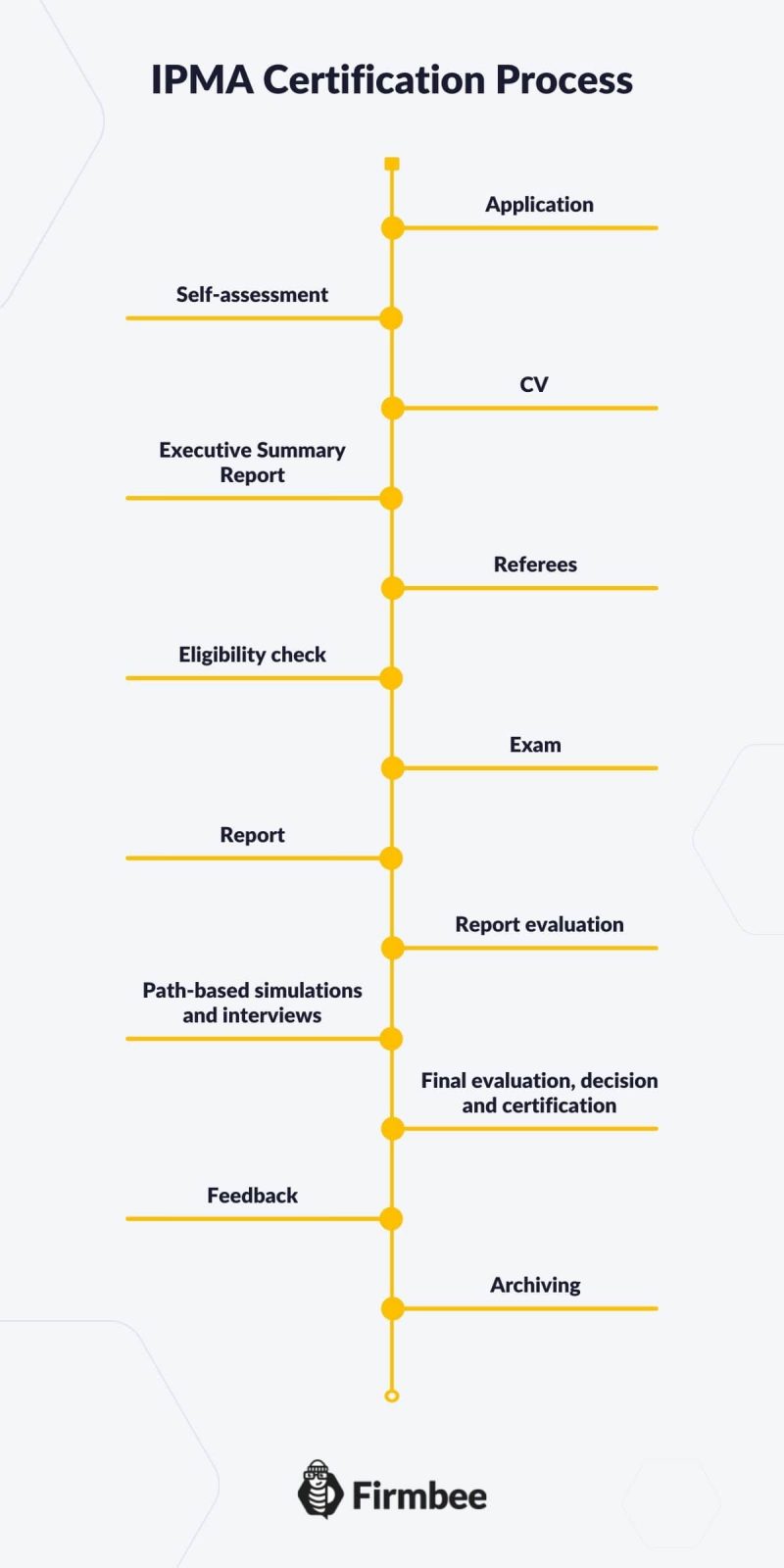Read about key steps of IPMA certification process and learn how to empower your competencies. Project management skills allow you to get the best out of people and deliver projects in competetive environments. Regardless of your role on the team, improving your project management skills can have a huge influence on the team’s ability to complete tasks.
IPMA certification process – table of contents:
- Application
- Self-assessment
- CV
- Executive Summary Report
- Referees
- Eligibility check
- Exam
- Report
- Report evaluation
- Path-based simulations and interviews
- Final evaluation, decision and certification
- Feedback
- Archiving
Application
The first step of IPMA certification process is the application. Each Certification Body provides an application form. It contains the candidate’s personal details and confirmation that they are familiar with the IPMA certification regulations and undertake to comply with them.
Self-assessment
At the application stage, the candidate must provide their self-assessment. For Levels A, B and C, the applicant completes a full self-assessment (knowledge, skills and abilities) for all CEs at the level applied for. For Level D, the applicant completes a self-assessment for knowledge for all CEs.
CV
Applicants for Level A, B or C certification must deliver a summary of any projects, programmes or portfolios they have managed or been engaged in to meet IPMA criteria. The applicant must provide detailed information to support the assessment.
Elements that should be included in the summary:
- applicant’s name and contact information,
- a career history, including ignificant roles and positions in projects, programmes and portfolios; degrees from accredited universities; professional certifications and qualifications; project, programme, and portfolio management training; professional memberships; other professional accomplishments, including awards or publications,
- an overview of projects, programmes, and portfolios that includes key deliverables, duration, budget, and complexity of projects, programmes or portfolios; the applicant’s role, responsibility, and extent of involvement in each.

For recertification, the certificate holder must submit the same CV along with evidence of taking at least 35 hours of Continuing Professional Development (CPD) each year since their last certification.
Executive Summary Report
The report may be used by the application assessors in preparation for the interview. For levels A, B and C, the applicant must submit an Executive Summary Report of up to 15 pages. This report must include:
- information about the organization (company details, industry, types of projects, the main objectives of the business unit where the applicant works),
- a one-page summary for each project, programme or portfolio with their schedules, phases and resources used,
- the applicant’s role in the organization, their responsibilities, a description of their project management procedures, and their relationships with internal and external stakeholders.
Referees
When applying for A,B, and C certification, as well as for recertification, the applicant must provide names and contact information of at least two referees who will be able to confirm their qualifications.
Eligibility check
The next step of IPMA certification process is the eligibility check. Based on the provided evidence, the CB decides whether to accept or reject the application for certification. If the applicant is accepted as meeting the eligibility criteria, they become a candidate.
However, if they do not meet the eligibility criteria, they will be informed about it. In such a situation, the applicant may either apply for certification at a lower level or provide additional documents proving that they meet the eligibility criteria.
Exam
For levels B, C and D, each Certification Body ensures that all exams are conducted in a suitable environment in accordance with procedures, and all questions and materials are securely controlled. This includes checking the candidate’s identity.
The Level B exam may be taken orally or in writing depending on the decision of Certification Body. It consists of open-ended questions that allow candidates to demonstrate knowledge only at the required level. The written exam lasts for three hours and the oral exam lasts for ninety minutes.
The level C exam is a written paper with open-ended questions only and lasts for three hours.
The level D exam is a written paper and consists of multiple choice and open-ended questions. The Level D exam is also three hours long.
Report
Candidates assessed at A and B levels submit a detailed report covering their projects, programmes or portfolios, which should be linked to the Executive Summary Report described in Section 4. It ought to contain a maximum of 25 pages of text and a maximum of 15 pages of attachments.
It should include a detailed description of the role of the project, programme or portfolio in terms of key stakeholders, key objectives, and the candidate’s responsibilities.
The candidate should also include an overview of management challenges throughout the project life cycle, programme or portfolio adequate to the level of certification which they are applying for.
The report must refer to the candidate’s experience with challenges associated with management and leadership. It should also describe how actions were taken and results achieved, as well as contain a reflection on those results and lessons learned.Report evaluation
The Certification Body chooses a competent person to assess the report against the requirements at the given level using evidence provided by the candidate. On this basis, the candidate either passes this part of the certification or is deemed incompetent.
Path-based simulations and interviews
After submitting the reports for A and B levels, there are two possible certification paths, i.e. either a scenario-based simulation and interview or an extended interview.
A simulation is a session during which a candidate must perform tasks relevant to the appropriate role (project, programme or portfolio) and level (A, B or C) while being observed by assessors. The purpose of this simulation is to assess the candidate’s personal skills in an environment where they must interact with others.
The candidate is evaluated individually and the assessment is not based on group performance.
Interviews, in turn, are designed to assess practical and perspective competencies.They are conducted by two individuals who determine which specific Competency Elements (CEs) and Key Competency Indicators (KCIs) are to be assessed. Questions are related to previously provided materials. Responses are recorded as evidence and later archived.
If the simulation is not possible, an extended interview is conducted. The interview time is extended so that specific CEs and KCIs could be fairly assessed.
Final evaluation, decision and certification
The final evaluation determines if the candidate has satisfactorily met all the required criteria for the chosen IPMA level. The assessment is then forwarded to the Certification Body for review and decision.
The Certification Body decides whether the candidate has passed the examination or is not yet competent based on the assessors’ recommendations, after verifying that all the procedures have been followed and documentation is complete.
Unless the candidate objects in writing to the Certification Body, information about the certificate is put on the IPMA website. Certificates are valid for five years. After five years, the certificate holder may apply either for recertification at the same level or certification at a new level – if they provide documentation to prove their skills.
Feedback
If the applicant is not accepted as a candidate or if they fail the certification process, they are informed about the reason in writing by the IPMA Certification Body.
Applicants and candidates may also be asked to complete a survey with feedback on their experience concerning the process. The feedback is not used as part of the candidate’s evaluation. It is only a part of the continuous improvement process.
Archiving
The last step of IPMA certification process is archiving. The Certification Body is required to adequately control and archive records for a minimum of six years.
If you like our content, join our busy bees community on Facebook, Twitter, LinkedIn, Instagram, YouTube.
Author: Caroline Becker
As a Project Manager, Caroline is an expert in finding new methods to design the best workflows and optimize processes. Her organizational skills and ability to work under time pressure make her the best person to turn complicated projects into reality.


















